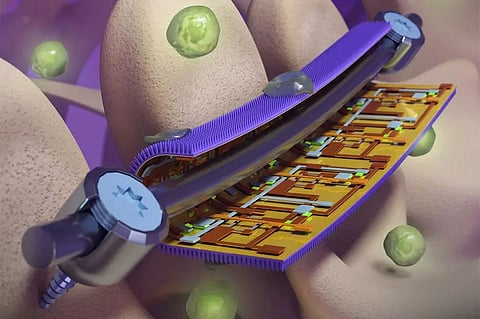
- Home
- Live Blog
- Breaking News
- Top Headlines
- Cities
- NE News
- Sentinel Media
- Sports
- Education
- Jobs

NEW YORK: US researchers have developed a new “smart” coating for surgical orthopaedic implants which can monitor strain on the devices to provide early warning of implant failures while also killing infection-causing bacteria.
The coatings, developed by a team at the University of Illinois Urbana-Champaign, integrate flexible sensors with a nanostructured antibacterial surface inspired by the wings of dragonflies and cicadas.
In the study, detailed in the journal Science Advances, the coatings prevented infection in live mice and mapped strain in commercial implants applied to sheep spines to warn of various implant or healing failures.
“This is a combination of bio-inspired nanomaterial design with flexible electronics to battle a complicated, long-term biomedical problem,” said Qing Cao, Professor of materials science and engineering at the varsity.
Both infection and device failure are major problems with orthopaedic implants, each affecting up to 10 per cent of patients, Cao said. Several approaches to fighting infection have been attempted, but all have severe limitations, he said. “Biofilms can still form on water-repelling surfaces, and coatings laden with antibiotic chemicals or drugs run out in a span of months and have toxic effects on the surrounding tissue with little efficacy against drug-resistant strains of bacterial pathogens.”
Taking inspiration from the naturally antibacterial wings of cicadas and dragonflies, the team created a thin foil patterned with nanoscale pillars like those found on the insects’ wings. When a bacterial cell attempts to bind to the foil, the pillars puncture the cell wall, killing it.
“Using a mechanical approach to killing bacteria allowed us to bypass a lot of the problems with chemical approaches, while still giving us the flexibility needed to apply the coating to implant surfaces,” said Gee Lau, a pathobiology professor, at the varsity. (IANS)
Also Watch: